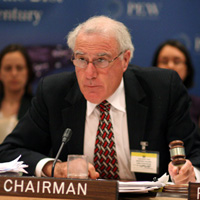Frequently Asked Questions answered by Sir Geoffrey Palmer
- What is the purpose of a constitution?
- What is the problem?
- What about the Constitution Act?
- Where is our constitutional framework described?
- What are the key elements of our constitutional framework?
- What is the constitutional position of the Treaty of Waitangi?
- What is the constitutional review process?
- What do you expect the review will deliver?
1. What is the purpose of a constitution?
The constitution is about the distribution of public power: who has it, how it can be exercised and what are the rules. What cannot be done is as important as what can be done.
New Zealand exhibits a high degree of constitutional elasticity. Few boundaries exist to constrain or direct its development. Our constitution is neither readily accessible nor easily understood (see question 4). Further, we do not have a written or codified constitution. New Zealand is one of only three countries that do not have a written constitution (the others are the United Kingdom and Israel). The Prime Minister is more powerful and less constrained than he or she would be in a country with a written or codified constitution. Our Constitution evolves remorselessly. It is like a living, breathing organism and it mutates.
3. What about the Constitution Act?
The constitutional history of New Zealand is odd. We clung to the apron strings of mother Britain as long as we possibly could. It took from 1931 until 1947 to cut the apron string. It was not until the Constitution Act 1986 that the power of the United Kingdom to make law for New Zealand by request and consent was finally extinguished. The Act recognises the Queen as the sovereign in right of New Zealand as the Head of State. The Governor-General is her representative in New Zealand. The Act deals with the executive, the legislature and the judiciary. The Constitution Act is not entrenched; it can be altered by ordinary statute.
4. Where is our constitutional framework described?
The Cabinet Manual is a useful compendium about how the framework works and many of the constitutional conventions are written there. But it needs to be remembered that many of the conventions are not legal rules and they can be changed. Click here to see the Cabinet Manual.
5. What are the key elements of our constitutional framework?
The elements all relate to one another because in an important sense there is an organic quality to the Constitution, the branches of Government and the relationships between them. In my opinion the critical elements of the constitutional framework are the:
1. Bill of Rights;
2. Constitutional position of the Treaty of Waitangi;
3. Parliament and the nature of the electoral system;
4. Power of the Prime Minister and Cabinet;
5. Nature of New Zealand’s political culture;
6. Supreme Court, and
7. Principle of parliamentary supremacy in law-making.
6. What is the constitutional position of the Treaty of Waitangi?
The Treaty is half in and half out of the legal system despite it being simply, the most important document in New Zealand’s history. Its constitutional status is similarly ambiguous. The situation is untidy, uncertain and indeterminate. It exhibits more uncertainty than is desirable. More than thirty years of legislative, judicial and Waitangi Tribunal activity have not reached an end where Māori rights are either stable or predictable. Consensus on the subject of the Treaty will be hard to achieve but it is likely to be the key that will unlock the prospect of progress in other areas.
7. What is the constitutional review process?
TheConstitutional Advisory Panel is an independent group established by Cabinet to implement the initial stage of the Consideration. The terms of reference can be found here. These involve preparing and commissioning opinion pieces on the topics within the scope of the project and establishing a forum for sharing information and ideas on those topics. The Deputy Prime Minister and the Minister of Māori Affairs will jointly lead the project. They will consult with the Cross-party Reference Group of MPs on major findings from the Panel and report to Cabinet.
8. What do you expect the review will deliver?
What the review will produce by way of change must remain a matter of speculation. It is possible the process will take off and gain a life of its own developing into a profound national conversation on our constitutional future. Somehow that seems unlikely, however. My own experience in this territory suggests that public forums and consultation work better if they are focussed on developing analytical proposals that have been thought through. I do think a Royal Commission would have provided a better platform from which to promote change if indeed change is desired. But a Royal Commission would cost much more than is planned for this exercise and would be less susceptible to ministerial control. It is fair to say that MPs are generally in favour of power for MPs and Ministers. The process may work. I hope it does. Nothing like it has been tried before. The New Zealand constitutional caravan is again on the road.
These questions are adapted with permission from a draft paper that will be published in the Law Review this year: The New Zealand Constitutional Caravan Moves On?
A poem written in 1853 titled “A quaint epistle to a political friend on the introduction of the New Zealand constitution in Wellington” is also available here.

